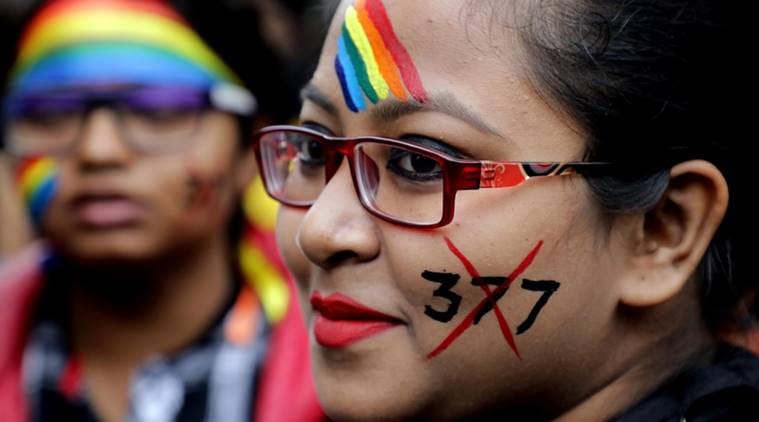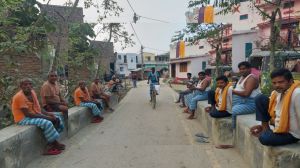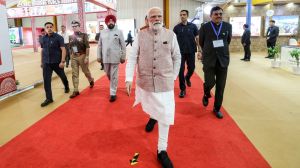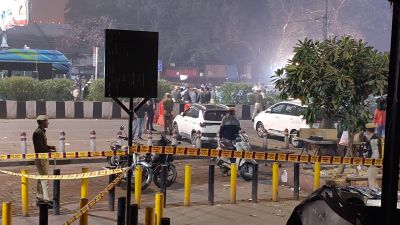A five-judge Constitution Bench of the Supreme Court, which Tuesday started hearing a clutch of petitions challenging Section 377 of the Indian Penal Code, was told that the law criminalising same sex relations between consenting adults was a product of Victorian era morality and deserved to be struck down as “unconstitutional”.
During the course of the hearing, Chief Justice of India Dipak Misra observed “you only have to impress on us that if Section 377 was to be enacted today, it would be struck down for violating fundamental rights” while his colleague Justice D Y Chandrachud, at another point, remarked that one’s choice of “partner would include same sex partner too”. Click here to read this in Tamil

Follow LIVE updates on SC hearing on Section 377 validity
The bench, also comprising Justices R F Nariman, A M Khanwilkar and Indu Malhotra, made it clear that it would not venture into the issue of marriage relating to the LGBTQ (lesbian, gay, bisexual, transgender and queer) community or inheritance in live-in relationships. The judges said they would only deal with the question of the validity of Section 377, and examine the correctness of the Supreme Court’s 2013 judgment that had overturned the Delhi High Court order decriminalising gay sex.
Story continues below this ad
Also Read | 18 years since Law panel said ‘delete’ Section 377, report quoted in Supreme Court hearing
“The question here is whether Section 377 is ultra vires or not. Let us get out of this maze. We cannot now give an advance ruling on questions like inheritance to live-in partners, whether they can marry, etc.
Those are individual issues we cannot pre-judge now,” CJI Misra said.
Senior advocate Arvind Datar, appearing for one of the petitioners, pointed to the August 2017 privacy judgment by a nine-judge Constitution Bench which ruled that sexual orientation was an essential attribute of privacy. Datar said this would be meaningless unless it included the right to choose one’s partner. “The moment (K S) Puttaswamy (privacy judgment) was pronounced, Section 377 was eclipsed and is liable to be struck down,” he said.
Story continues below this ad
At this, Justice Chandrachud said: “We had already held that one’s choice of partner is part of Article 21 (protection of life and personal liberty). So partner would include same sex partner too.”
Read | What is Section 377 of IPC?
Addressing the bench, senior advocate Mukul Rohatgi said Section 377 was the product of Victorian era morality. “The position of ancient India was different,” he said, referring to Shikhandi of Mahabharata and the images at Khajuraho.
Datar echoed this when he said there was a time in England when same sex relation was punishable with death.
He said the IPC was not a law made by Parliament, but a pre-constitutional law “based on religious sentiments of the time” and had no scientific basis. To highlight the sad state of affairs that science enjoyed in the past, he cited how Copernicus was denounced for contending that the sun, and not the earth, was at the centre of the universe.
Story continues below this ad
Datar said that choice of a same sex partner was a “normal and benign variation of sexuality”. At this, Justice Malhotra said homosexuality was present not just in humans, but also in animals.
The bench did not agree with Datar’s contention that pre-Independence laws did not enjoy constitutionality. CJI Misra said “if you say IPC does not enjoy constitutionality, it will affect an entire range of laws”. He asked Datar if there “is any ruling of this court that pre-Independence laws will not have the force of the Constitution”.
Datar said: “No, I’m only saying it does not have the will of the Parliament”.
The CJI said “you only have to impress on us that if Section 377 was to be enacted today, it would be struck down for violating fundamental rights”.
Story continues below this ad
Rohatgi said being a gay or lesbian “is not a matter of choice. It is something which you are born with and you react in a way different from the majority”. Section 377 uses the words order of nature, but this is also an order of nature, he argued.
He said the LGBTQ community members have been facing persecution and loss of employment because society looked at them differently, mainly because of the 158-year-old law.
Justice Nariman told Rohatgi, “you should concentrate on two points – whether the order of nature is a relative concept and whether this itself is the order of nature”.
Rohatgi sought to know if a pre-constitutional law like Section 377, which he said has not been confirmed by the Constitution, enjoys the same level of presumption as a post-constitutional law. He said the order of nature can change with passage of time and laws made 50 years ago can become invalid with time.
Story continues below this ad
Pointing out that acts under Section 377 comes under the definition of “unnatural offences”, he asked what was unnatural. So it means even sex between a man a woman unless done in the “conventional” way also becomes unnatural under the provision.
Besides striking down the section, Rohtagi also sought a declaration under the Constitution for protection of the rights of “sexual minorities” including on matters of marriage, inheritance adoption and live-in.
Additional Solicitor General Tushar Mehta objected to this and said the court cannot go into the larger issue as the same is beyond the scope of reference made to the Constitution bench. He added that the court cannot proceed with such a hearing without knowing the Centre’s stand.
“I have an application wanting time to file a written response,” Mehta said. “We (Centre) are in the process of a candid discussion. It would be unfair for the court to take up the prayer that is made for the first time,” he said.
Story continues below this ad
Mehta said the petitioners must confine to the Constitutionality of section 377 and that the Centre would place its stand during the course of the hearing.
Justice Chandrachud told Mehta that the matter was before a larger bench and restriction of issues was not appropriate. But Mehta would not budge.
Disagreeing with the ASG, Rohatgi said “I can argue for my rights. My life as a sexual minority has to be protected. Do not restrict this hearing to just the validity of Section 377. Our lives are passing by. How many of us can come on individual issues later? I was asking a principle to be laid down to protect my rights under Article 21.”
Intervening, the CJI clarified that the court and parties should confine itself now to the question of Section 377 and will take up the other matter when individual cases come up before it.
Story continues below this ad
Rohtagi and Datar also contended that the Centre had not filed its appeal against the 2013 judgment of the Delhi High Court. Mehta replied that the Centre’s stand is yet to be made.

 LGBT activist during the 16th Kolkata Rainbow pride walk 2017 in South Kolkata. (Express photo by Partha Paul)
LGBT activist during the 16th Kolkata Rainbow pride walk 2017 in South Kolkata. (Express photo by Partha Paul)






